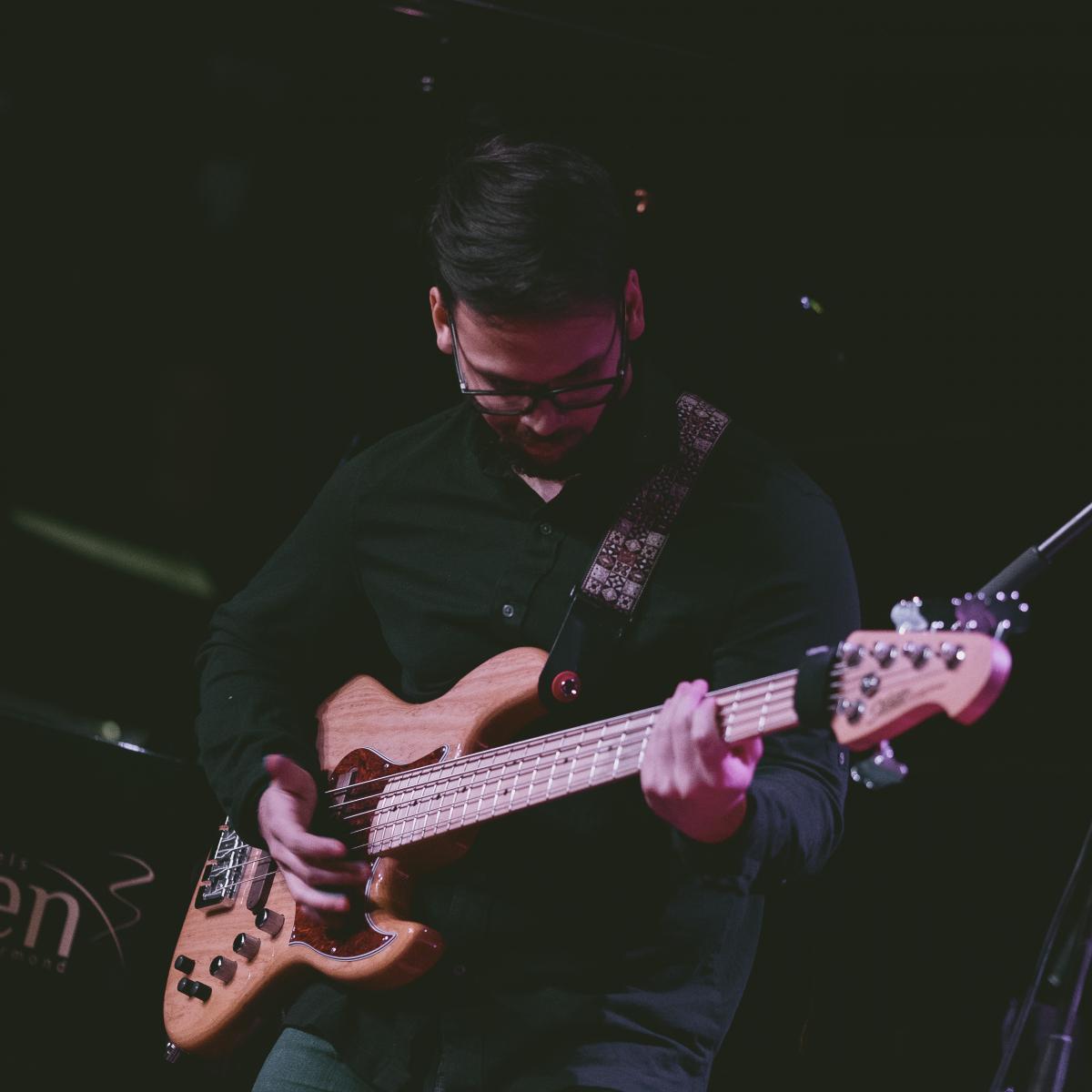
Bachelor
Electric Bass
As a student in this four-year Bachelor’s programme, you will get the opportunity to listen, play and learn in the inspiring environment of our Bass department:
You will have regular one-to-one lessons with the main subject Bass teachers, subsidiary subject lessons in Electric Bass (for Double Bass students) and Double Bass (for Electric Bass students), monthly group lessons focusing on bass history, practice techniques and current music, bass methodology classes, studio recordings, plenty of band rehearsals (coached by our faculty) focusing on repertoire (year 1 and 2) and specific musical styles (year 3), as well as having the opportunity to bring in your own musical ideas and compositions.
The individual bass lessons will provide you with improvisation techniques, harmonic knowledge, technical skills and grooves/rhythm concepts for various musical situations and styles (jazz/fusion, funk/soul, Latin/salsa, pop/rock, world music). Naturally, the programme can be tailored to your personal level and needs.
To complete the programme, we offer Bass workshops and masterclasses (taught by artists like Richard Bona, Scott Colley, John Clayton, Ben Street, Alain Caron, Linley Marthe, Lincoln Goines, Hein van de Geyn, Michel Hatzigeorgiou, Jimmy Haslip etc.). Double Bass students have the chance to meet guest lecturer John Goldsby (WDR Big Band) every month during the academic year.
Meet our team
Meet your lecturers
Curriculum
Curriculum
|
Major Bass Guitar |
More info |
Year 1 |
Year 2 |
Year 3 |
Year 4 |
|---|---|---|---|---|---|
Main Subject and Components related to the Main Subject |
27 |
23 |
40 |
44 |
|
Main subject |
25 |
21 |
38 |
44 |
|
Side Subject Double Bass |
2 |
2 |
2 |
||
Band & Performing |
8 |
8 |
8 |
8 |
|
Band |
8 |
8 |
8 |
8 |
|
Composing & Arranging |
3 |
||||
Arranging Jazz |
3 |
||||
Recording & Producing |
2 |
1 |
|||
Studio Recording |
1 |
||||
Capturing and Shaping Sound / OOP |
2 |
||||
Tools in Creation |
17 |
17 |
|||
Aural Skills Jazz |
6 |
6 |
|||
Applied Theory Combo |
1 |
1 |
|||
Choir Jazz (general) |
2 |
||||
Theoretical Analysis Jazz |
5 |
6 |
|||
Applied Piano Jazz |
2 |
2 |
|||
Rhythmic Solfège Jazz |
1 |
||||
Percussion & Pulse |
2 |
||||
Research & Development Skills |
3 |
3 |
|||
Critical Listening |
|||||
A. Jazz Music History |
2 |
2 |
|||
B. Listening in context |
1 |
1 |
|||
Health & Wellbeing |
1 |
||||
Health & Well-being |
1 |
||||
International Career Center |
5 |
1 |
2 |
2 |
|
Your Art as a Business |
1 |
2 |
2 |
||
OOP |
5 |
||||
Teaching & Outreach Programme |
2 |
||||
Basic Teaching Skills Lectures |
1 |
||||
Basic Teaching Skills Instrument Specific Methodology |
1 |
||||
Minor |
9 |
6 |
|||
Elective Modules |
9 |
6 |
Before you apply
Admission
requirements
Video Requirements
share your un-edited (!) video recording links in the portfolio; Videos should be uploaded to your YouTube channel ( if you don’t have one, make one). Set your videos to ‘unlisted’ so only you and we can see them. IMPORTANT: DO NOT send the actual video(s): ONLY LINKS to the video(s)
Videos should have good audio quality, where we can hear your playing very well. You can make separate short videos or one longer one. - The candidate presents him/herself in English at the start of the video; - Then show yourself, playing the bass for (at least) 10 minutes;
video:
with 3 tunes of Jazz / Pop / Fusion / Latin repertoire
(min. 2 different styles, 1 must contain II-V-I chord progressions) performing a bass line
(improvised accompaniment and (at least) one theme/melody and one solo.
Jazz skills accompany a blues and rhythm changes (improvised walking bass)
technical skills affinity with your instrument and feeling for jazz/pop/latin music & feel good
understanding of rhythm, groove and tempo experience in slapping technique and basic
salsa pattern (ʻtumbaoʼ).
music theory scales and chords: all major and minor scales, musical modes and
corresponding 7th chords (also harmonic & melodic minor), pentatonic, octatonic, wholetone
and altered scale: ability to recognize and play over a two-octave range II-V-I chord
progression sightreading sufficient knowledge of bass clef notation and chord symbols a)
sight-reading
share your un-edited (!) video recording with us.
dependent on your playing level on the video, you will invited for a skype meeting to check
your music theory knowledge and reading skills.
Introduce yourself in a separate video in English: tell us your name, age, how old you were when you started playing electric bass, why you would like to study in Maastricht, and anything else you think is important for us to know.
• In case that your material is selected you will get an invitation for an online theory test and if necessary an online meeting with the main subject teachers.
NOTE: The requirements above are also the Erasmus Application Requirements